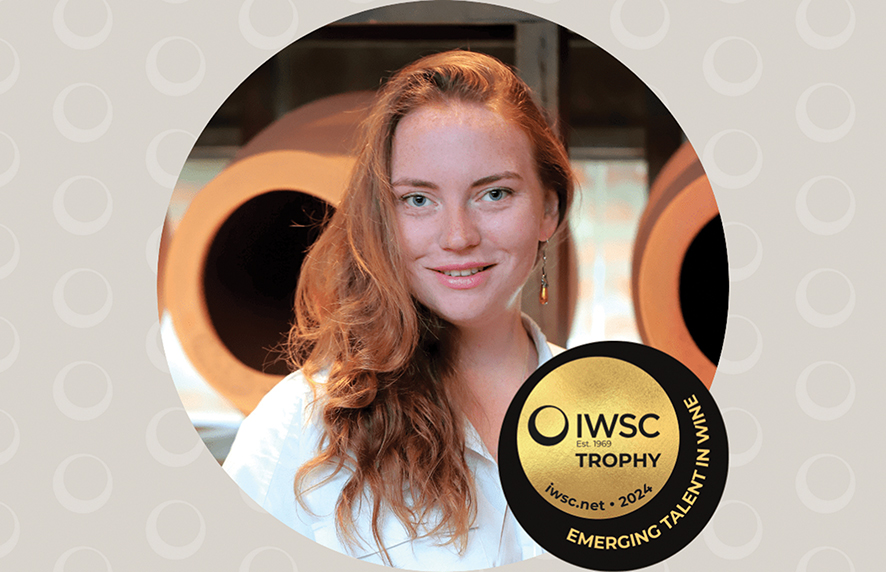Wine educator Daria Kholodilina, a Ukrainian native living in Georgia since 2013, was named the 2024 Emerging Talent in Wine Award on behalf of Georgia by the Global Wine and Spirits Community (IWSC) at this year’s London Wine Fair.
“Daria is making massive changes and moving the entirety of the Georgian wine industry forward,” said the IWSC judges. “She’s achieved so much – just her impact, her resourcefulness, the kind of work she’s doing – it creates markets and changes things.”
The judges were impressed by how, in just a few years, since her move to Georgia from Ukraine in 2013, she had acquired such a deep knowledge of Georgian wine and become a highly respected figure in the industry. Daria co-wrote a book on Georgian wine – Vinologue Georgia: A Guide to the Cradle of Wine; hosted a podcast and a radio show on the same subject, and started her own enotourism company – Trails and Wines.
In 2020, Daria spent three months driving around Georgia, visiting wineries and shooting interviews with winemakers. Her notes and interviews were passed on to the importers of Georgian wine in Germany, France, Switzerland and the Netherlands, helping them promote the wines. Daria also organizes trainings on wine tourism development and runs multiple tasting events, presenting Georgian wine in its homeland and abroad.
The IWSC experts are said to have spoken highly of Daria’s work empowering Georgian winemakers, and educating the world about Georgian wines, while the judges admired Daria’s intention to spend her £2.5k travel bursary to give back to her community and further her impact. In her application form, Daria shared that she had two ideas for spending her bursary – an apprenticeship at a European winery to deliver more insightful training sessions for Georgian winemakers; or representing small Georgian producers at one of the big trade fairs.

GEORGIA TODAY sat down with Daria to find out how she got started in Georgian wine, the platforms she uses to share her knowledge with others, and some tips for those wanting to enter the field.
“I became interested in wine when I was a teenager, just because I liked how versatile it was,” she tells us. “I would attend wine tastings with my parents when we were traveling, and I could smell the difference, though of course I was not allowed to drink at the time. Then I lived in Germany and tasted some there before I came to Georgia- and that’s a completely different world.
“I started visiting wineries and participating in more tastings and, from around 2016, I started to write about it in my blog.”
What has your journey with wine been so far?
I started to attend courses in Georgia about what wine is and how it works, attending lectures, and growing my knowledge. Then, in 2018, I started a wine tours company, Trails and Wines, and became a wine guide. Then I published a book and got certified to the gold standard level by the Wines and Spirit Education Trust (WSET). My husband got on board, and we started working with other guides, and suddenly I was organizing all of them! After COVID hit, some importers reached out to me and asked if I could visit the wineries they were working with to check how the wine was and to record some videos. Once COVID wound down, I decided to host an in-person Georgian wine crash course, so people who live in Tbilisi don’t feel confused when they enter shops [wineries] and can make conscious decisions. After the course, I did a training to further package my knowledge. Then, in 2022, I was hired for a project as a wine tourism consultant for small wineries.
Why did Georgian wine pique your interest?
I couldn’t realize why it was so different at first. Everybody was talking about the tradition, but in 2014 and 2015, people were talking about skin contact and other details that I didn’t get. Then there were the random wine shops in the old town, and they would see this Slavic face and say, ‘Ooh, want some Kindzmarauli?’ I couldn’t figure out why it was so different until I started visiting wineries, and, at some point, I realized it was not only qvevri but this narrative in the world that there are two technologies: Kakhetian and Imeretian. That’s what they mean with skin contact and without skin contact, white wine. I was intrigued by this qvevri story and how it sometimes works and sometimes doesn’t, because all the homemade skin contact wines I tasted were too apple-y, cider-y, or tasted like regular white wine, so I wasn’t sure what to think of it. Then I tasted a really great amber wine in a shop, and I fell so much in love that I understood that’s where I wanted to dig.
It was already an established community, and I was a bit shy, but I was also going to festivals and tastings, and I listened a lot, and tasted a lot, then I met people and became more comfortable. In the beginning, when I realized how good qvevri wine with skin contact is, this amber wine, how good it could be, I thought, ‘Whoa, different universe’.
What is your main goal now, moving forward with Georgian wine?
To make Georgian wine better known. I relaunched my Instagram, dariko.drinks.wine, in December and decided that this page would be for wine content only. Now, after the relaunch, there are only wine people following my page, some of whom are also interested in Georgian wine. These are people from all around the world as well as Georgia. It’s in English, but I’m thinking of adding a part in Georgian, because I feel a lot of Georgians follow me because they find me interesting as a character, like this funny foreigner who came here and learned about wine, but they don’t understand a lot of things I’m talking about. I’m thinking of doing one post a week in Georgian that includes basic wine education or on the wines of the world, something that Georgian people might not know about or would like to learn more about.
How did it feel when you found out you had won the 2024 Emerging Talent in Wine Award?
The day I got featured in the top five, I happened to have a terrible headache, so I went to bed for a nap. When I woke up, I saw so many notifications, people congratulating me for being featured in the top five. Then I saw who was on the shortlist- women who are so brilliant and much further on in their wine studies than me. These were such cool, strong, people, and it was already an achievement to be among them. Then, one week later, I saw a bunch of notifications again and I was like, ‘No way’.
I think they picked me because I was representing the country, not a certain style. They give a stipend as a reward to use towards wine education, and when asked what I would do with it, I said I could do training with the small wineries, and if I want to attend a big wine event, I might think about it in advance and pick some wineries to represent who don’t have money or speak the language. This is one of my ideas.
What’s your favorite wine?
My favorite grape variety from Georgia is Kakhuri Mtsvane. My favorite producer is Marani Milorauli, whose Amber Mtsvane is delightful. Every vintage is very well made. I love it.
What’s one tip you would give someone looking to enter the wine industry?
Attend some courses to expand your pallet and get an insight into how the world of wine works. I would start with WSET level two- it’s a week in Georgia in the classroom with an educator. It will give you broad knowledge, let you taste a lot of wine in a short period, and then you can already navigate the shelves in the big shops.
Interview by Shelbi R. Ankiewicz














